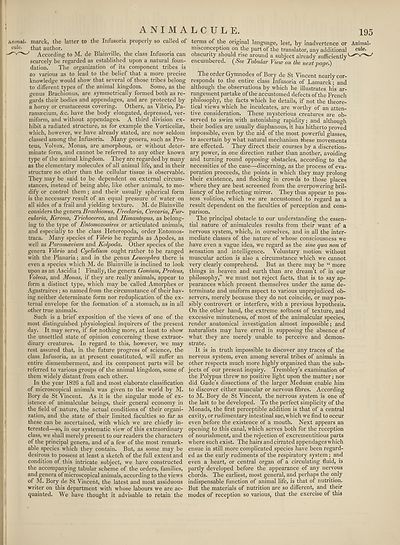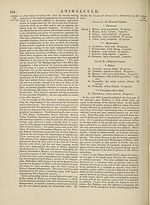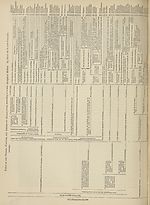Encyclopaedia Britannica > Volume 3, Anatomy-Astronomy
(203) Page 195
Download files
Complete book:
Individual page:
Thumbnail gallery: Grid view | List view

ANIMALCULE.
195
Animal- marck, the latter to the Infusoria properly so called of terms of the original language, lest, by inadvertence or Animal-
cuIe- that author. , T „ . miscon.ception on the part of the translator, any additional cute.
According to M. de Blainville, the class Infusoria can obscurity should rise around a subject already sufficiently
scarcely be regarded as established upon a natural foun- encumbered. {See Tabular View on the next paqe>> ^
dation. The organization of its component tribes is l u ')
so various as to lead to the belief that a more precise The order Gymnodes of Bory de St Vincent nearly cor-
knowledge would show that several of those tribes belong responds to the entire class Infusoria of Lamarck • and
to different types of the animal kingdom. Some, as the although the observations by which he illustrates his ar-
genus Brachionus, are symmetrically formed both as re- rangement partake of the accustomed defects of the French
gards their bodies and appendages, and are protected by philosophy, the facts which he details, if not the theore-
a horny or crustaceous covering. Others, as Vibrio, Pa- tical views which he inculcates, are worthy of an atten-
ramaecium, &c. have the body elongated, depressed, ver- tive consideration. These mysterious creatures are ob-
miform, and without appendages. A third division ex- served to swim with astonishing rapidity; and although
hibit a radiated structure, as for example the Vorticellae, their bodies are usually diaphanous, it has hitherto proved
which, however, we have already stated, are now seldom impossible, even by the aid of the most powerful glasses,
classed among the Infusoria. Many genera, such as Pro- to ascertain by what natural mechanism these movements
teus, Volvox, Monas, are amorphous, or without deter- are effected. They direct their courses by a discretion-
minate form, and cannot be referred to any other known ary power, in one direction rather than another, avoiding
type of the animal kingdom. They are regarded by many and turning round opposing obstacles, according to the
as the elementary molecules of all animal life, and in their necessities of the case—discerning, as the process of eva-
structure no other than the cellular tissue is observable, poration proceeds, the points in which they may prolong
They may be said to be dependent on external circum- their existence, and flocking in crowds to those places
stances, instead of being able, like other animals, to mo- where they are best screened from the overpowering bril-
dify or control them ; and their usually spherical form liancy of the reflecting mirror. They thus appear to pos-
is the necessary result of an equal pressure of water on sess volition, which we are accustomed to regard as a
all sides of a frail and yielding texture. M. de Blainville result dependent on the faculties of perception and com-
considers the genera Brachionus, Urcelaria, Cercaria, Fur- parison.
cularia, Kerona, Trichocerca, and Himantopus, as belong- The principal obstacle to our understanding the essen-
ing to the type of Entomozoaires or articulated animals, tial nature of animalcules results from their want of a
and especially to the class Heteropoda, order Entomos- nervous system, which, in ourselves, and in all the inter-
traca. Many species of Vibrio he regards as Apodes, as mediate classes of the nature of whose consciousness we
well as Paramcecium and Kolpoda. Other species of the have even a vague idea, we regard as the sine qua non of
genera Vibrio and Cyclidium ought rather to be ranged sensation and intelligence. Voluntary motion without
with the Planaria; and in the genus Leucophra there is muscular action is also a circumstance which we cannot
even a species which M. de Blainville is inclined to look very clearly comprehend. But as there may be “ more
upon as an Ascidia ! Finally, the genera Gonium, Proteus, things in heaven and earth than are dream’t of in our
Volvox, and Monas, if they are really animals, appear to philosophy,” we must not reject facts, that is to say ap-
form a distinct type, which may be called Amorphes or pearances which present themselves under the same de-
Agastraires; so named from the circumstance of their hav- terminate and uniform aspect to various unprejudiced ob-
ing neither determinate form nor reduplication of the ex- servers, merely because they do not coincide, or may pos-
ternal envelope for the formation of a stomach, as in all sibly controvert or interfere, with a previous hypothesis,
other true animals. On the other hand, the extreme softness of texture, and
Such is a brief exposition of the views of one of the excessive minuteness, of most of the animalcular species,
most distinguished physiological inquirers of the present render anatomical investigation almost impossible; and
day. It may serve, if for nothing more, at least to show naturalists may have erred in supposing the absence of
the unsettled state of opinion concerning these extraor- what they are merely unable to perceive and demon¬
dinary creatures. In regard to this, however, we may strate.
rest assured that, in the future progress of science, the It is in truth impossible to discover any traces of the
class Infusoria, as at present constituted, will suffer an nervous system, even among several tribes of animals in
entire dismemberment, and its component parts will be other respects much more highly organized than the sub¬
referred to various groups of the animal kingdom, some of jects of our present inquiry. Trembley’s examination of
them widely distant from each other. the Polypus threw no positive light upon the matter; nor
In the year 1826 a full and most elaborate classification did Gade’s dissections of the larger Medusae enable him
of microscopical animals was given to the world by M. to discover either muscular or nervous fibres. According
Bory de St Vincent. As it is the singular mode of ex- to M. Bory de St Vincent, the nervous system is one of
istence of animalcular beings, their general economy in the last to be developed. To the perfect simplicity of the
the field of nature, the actual conditions of their organi- Monads, the first perceptible addition is that of a central
zation, and the state of their limited faculties so far as cavity, or rudimentary intestinal sac, which we find to occur
these can be ascertained, with which we are chiefly in- even before the existence of a mouth. Next appears an
terested—so, in our systematic view of this extraordinarjr opening to this canal, which serves both for the reception
class, we shall merely present to our readers the characters of nourishment, and the rejection of excrementitious parts
of the principal genera, and of a few of the most remark- where such exist. The hairs and cirrated appendages which
able species which they contain. But, as some may be ensue in still more complicated species have been regard-
desirous to possess at least a sketch of the full extent and ed as the early rudiments of the respiratory system; and
condition of this intricate subject, we have constructed even a heart, or central organ of a circulating fluid, is
the accompanying tabular scheme of the orders, families, partly developed before the appearance of any nervous
and genera of microscopical animals, according to the views chords. The earliest, most general, and perhaps the only
of M. Bory de St Vincent, the latest and most assiduous indispensable function of animal life, is that ot nutrition,
writer on this department with whose labours we are ac- But the materials of nutrition are so different, and their
quainted. We have thought it advisable to retain the modes of reception so various, that the exercise of this
195
Animal- marck, the latter to the Infusoria properly so called of terms of the original language, lest, by inadvertence or Animal-
cuIe- that author. , T „ . miscon.ception on the part of the translator, any additional cute.
According to M. de Blainville, the class Infusoria can obscurity should rise around a subject already sufficiently
scarcely be regarded as established upon a natural foun- encumbered. {See Tabular View on the next paqe>> ^
dation. The organization of its component tribes is l u ')
so various as to lead to the belief that a more precise The order Gymnodes of Bory de St Vincent nearly cor-
knowledge would show that several of those tribes belong responds to the entire class Infusoria of Lamarck • and
to different types of the animal kingdom. Some, as the although the observations by which he illustrates his ar-
genus Brachionus, are symmetrically formed both as re- rangement partake of the accustomed defects of the French
gards their bodies and appendages, and are protected by philosophy, the facts which he details, if not the theore-
a horny or crustaceous covering. Others, as Vibrio, Pa- tical views which he inculcates, are worthy of an atten-
ramaecium, &c. have the body elongated, depressed, ver- tive consideration. These mysterious creatures are ob-
miform, and without appendages. A third division ex- served to swim with astonishing rapidity; and although
hibit a radiated structure, as for example the Vorticellae, their bodies are usually diaphanous, it has hitherto proved
which, however, we have already stated, are now seldom impossible, even by the aid of the most powerful glasses,
classed among the Infusoria. Many genera, such as Pro- to ascertain by what natural mechanism these movements
teus, Volvox, Monas, are amorphous, or without deter- are effected. They direct their courses by a discretion-
minate form, and cannot be referred to any other known ary power, in one direction rather than another, avoiding
type of the animal kingdom. They are regarded by many and turning round opposing obstacles, according to the
as the elementary molecules of all animal life, and in their necessities of the case—discerning, as the process of eva-
structure no other than the cellular tissue is observable, poration proceeds, the points in which they may prolong
They may be said to be dependent on external circum- their existence, and flocking in crowds to those places
stances, instead of being able, like other animals, to mo- where they are best screened from the overpowering bril-
dify or control them ; and their usually spherical form liancy of the reflecting mirror. They thus appear to pos-
is the necessary result of an equal pressure of water on sess volition, which we are accustomed to regard as a
all sides of a frail and yielding texture. M. de Blainville result dependent on the faculties of perception and com-
considers the genera Brachionus, Urcelaria, Cercaria, Fur- parison.
cularia, Kerona, Trichocerca, and Himantopus, as belong- The principal obstacle to our understanding the essen-
ing to the type of Entomozoaires or articulated animals, tial nature of animalcules results from their want of a
and especially to the class Heteropoda, order Entomos- nervous system, which, in ourselves, and in all the inter-
traca. Many species of Vibrio he regards as Apodes, as mediate classes of the nature of whose consciousness we
well as Paramcecium and Kolpoda. Other species of the have even a vague idea, we regard as the sine qua non of
genera Vibrio and Cyclidium ought rather to be ranged sensation and intelligence. Voluntary motion without
with the Planaria; and in the genus Leucophra there is muscular action is also a circumstance which we cannot
even a species which M. de Blainville is inclined to look very clearly comprehend. But as there may be “ more
upon as an Ascidia ! Finally, the genera Gonium, Proteus, things in heaven and earth than are dream’t of in our
Volvox, and Monas, if they are really animals, appear to philosophy,” we must not reject facts, that is to say ap-
form a distinct type, which may be called Amorphes or pearances which present themselves under the same de-
Agastraires; so named from the circumstance of their hav- terminate and uniform aspect to various unprejudiced ob-
ing neither determinate form nor reduplication of the ex- servers, merely because they do not coincide, or may pos-
ternal envelope for the formation of a stomach, as in all sibly controvert or interfere, with a previous hypothesis,
other true animals. On the other hand, the extreme softness of texture, and
Such is a brief exposition of the views of one of the excessive minuteness, of most of the animalcular species,
most distinguished physiological inquirers of the present render anatomical investigation almost impossible; and
day. It may serve, if for nothing more, at least to show naturalists may have erred in supposing the absence of
the unsettled state of opinion concerning these extraor- what they are merely unable to perceive and demon¬
dinary creatures. In regard to this, however, we may strate.
rest assured that, in the future progress of science, the It is in truth impossible to discover any traces of the
class Infusoria, as at present constituted, will suffer an nervous system, even among several tribes of animals in
entire dismemberment, and its component parts will be other respects much more highly organized than the sub¬
referred to various groups of the animal kingdom, some of jects of our present inquiry. Trembley’s examination of
them widely distant from each other. the Polypus threw no positive light upon the matter; nor
In the year 1826 a full and most elaborate classification did Gade’s dissections of the larger Medusae enable him
of microscopical animals was given to the world by M. to discover either muscular or nervous fibres. According
Bory de St Vincent. As it is the singular mode of ex- to M. Bory de St Vincent, the nervous system is one of
istence of animalcular beings, their general economy in the last to be developed. To the perfect simplicity of the
the field of nature, the actual conditions of their organi- Monads, the first perceptible addition is that of a central
zation, and the state of their limited faculties so far as cavity, or rudimentary intestinal sac, which we find to occur
these can be ascertained, with which we are chiefly in- even before the existence of a mouth. Next appears an
terested—so, in our systematic view of this extraordinarjr opening to this canal, which serves both for the reception
class, we shall merely present to our readers the characters of nourishment, and the rejection of excrementitious parts
of the principal genera, and of a few of the most remark- where such exist. The hairs and cirrated appendages which
able species which they contain. But, as some may be ensue in still more complicated species have been regard-
desirous to possess at least a sketch of the full extent and ed as the early rudiments of the respiratory system; and
condition of this intricate subject, we have constructed even a heart, or central organ of a circulating fluid, is
the accompanying tabular scheme of the orders, families, partly developed before the appearance of any nervous
and genera of microscopical animals, according to the views chords. The earliest, most general, and perhaps the only
of M. Bory de St Vincent, the latest and most assiduous indispensable function of animal life, is that ot nutrition,
writer on this department with whose labours we are ac- But the materials of nutrition are so different, and their
quainted. We have thought it advisable to retain the modes of reception so various, that the exercise of this
Set display mode to:
![]() Universal Viewer |
Universal Viewer | ![]() Mirador |
Large image | Transcription
Mirador |
Large image | Transcription
Images and transcriptions on this page, including medium image downloads, may be used under the Creative Commons Attribution 4.0 International Licence unless otherwise stated. ![]()
| Encyclopaedia Britannica > Encyclopaedia Britannica > Volume 3, Anatomy-Astronomy > (203) Page 195 |
|---|
| Permanent URL | https://digital.nls.uk/193759987 |
|---|
| Attribution and copyright: |
|
|---|---|
| Shelfmark | EB.16 |
|---|---|
| Description | Ten editions of 'Encyclopaedia Britannica', issued from 1768-1903, in 231 volumes. Originally issued in 100 weekly parts (3 volumes) between 1768 and 1771 by publishers: Colin Macfarquhar and Andrew Bell (Edinburgh); editor: William Smellie: engraver: Andrew Bell. Expanded editions in the 19th century featured more volumes and contributions from leading experts in their fields. Managed and published in Edinburgh up to the 9th edition (25 volumes, from 1875-1889); the 10th edition (1902-1903) re-issued the 9th edition, with 11 supplementary volumes. |
|---|---|
| Additional NLS resources: |
|

